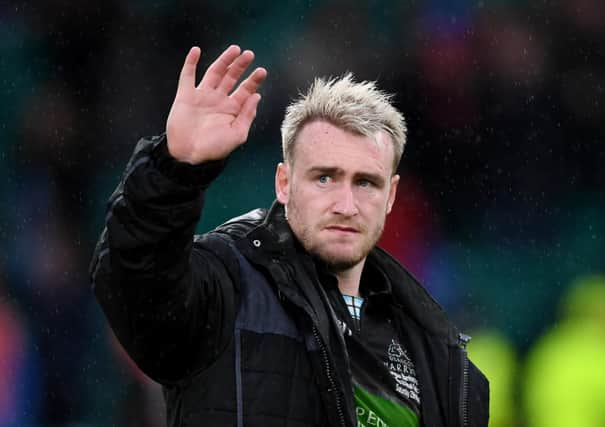Allan Massie: Financial squeeze means there is now little incentive for Scots to head south


With the Guinness Pro14 having announced a schedule for the restart of the season before we go into this season’s season – if you see what I mean – we are almost within sight of the shutters being lifted. Nevertheless, we are aware, and will remain aware for months, that any emergence of a second wave of Covid-19, even a small one, may lead to them coming down again.
One thing is already clear. It is a belt-tightening time for the professional game. The days of so-called marquee signings are over, probably for a couple of years at least. This will make little difference in Scotland because we haven’t been able to afford such recruiting. Even so, one may see fewer contracts offered to southern hemisphere players, some of whom in the past haven’t proved outstanding. Of course the nature of the season, with Glasgow and Edinburgh losing the best part of a XV to international duty in November, February and March, while league matches still have to be played, has made recruitment of players not qualified for Scotland unavoidable.
Advertisement
Hide AdAdvertisement
Hide AdAt the same time we can’t afford to retain players good enough to be in demand from top French and English clubs: Greig Laidlaw went first, then Finn Russell, then Stuart Hogg and most recently Jonny Gray. Now that the English Premiership is experiencing a financial chill and the salary cap has been squeezed, there may be little financial incentive for Scottish players to go over the Border.
Throughout history the Scotland team has tended to include more players from clubs outwith the country they represent than either Wales or Ireland. The 1984 Grand Slam winning team was a rare exception, Jim Pollock from Gosforth being the only member of the side that won the decider against France who wasn’t playing for a Scottish club. The 1990 side had five. Gavin Hastings and Derek White were then playing their club rugby for London Scottish as was Paul Burnell who never played club rugby in Scotland; nor did Chris Gray (Nottingham) and Damian Cronin (Bath). Against France this March the starting XV featured Stuart Hogg (Exeter), Sean Maitland (Saracens) and Chris Harris (Gloucester) while Alan Dell (London Irish), Sam Skinner (Exeter) and Duncan Weir (Worcester) all came on as replacements. Go back to the World Cup in Japan and we had Finn Russell (Racing 92) and Greig Laidlaw (Clermont-Auvergne) at half-back.
Whatever the financial constraints elsewhere now, it is unlikely that this will change in the near future – certainly not while we have only two professional clubs and the prospect of a third one is obviously even further away than it was.
The narrow base makes for problems for both club and country. During last year’s World Cup there were a couple of weeks when none of the half-backs starting league matches for Edinburgh and Glasgow was qualified to play for Scotland even though one might have thought that, with international players absent, this was an opportunity to bring on young Scottish players. Now Ali Price and George Horne who played in the Six Nations are both with Glasgow, with the very promising young Jamie Dobie in reserve, while at Edinburgh Charlie Shiel has often found himself playing second fiddle to the South African Nic Groom or Henry Pyrgos, now in sight of veteran status.
The SRU and successive Scotland coaches have always been relaxed about the possibility of players moving to further their careers, remarking, truthfully, that this made space and gave opportunities to others. This is fair comment, and it is obvious that Adam Hastings might not have developed his game so quickly if Finn Russell hadn’t left Glasgow for Paris. On the other hand, the departure in successive seasons of Russell, Hogg and now Jonny Gray undoubtedly leaves Glasgow less well-equipped to compete with Leinster and Munster in the Pro14 and even to reach the knock-out stages of the Heineken European Cup, let alone to win it. A Pro14 semi-final and a European quarter-final is, to be realistic, the best that either Glasgow or Edinburgh can reasonably aspire to.
No matter. It’s agreeable and a relief to be at last looking forward to the resumption of rugby in a couple of months. As for the amateur game which is after all something that immediately concerns more players, club officials and supporters, it is difficult to see why this should not resume – God willing and with the virus suppressed – at the same time as the professional game. Given that most amateur rugby attracts few spectators, often no more than family and partners and a dog or two in the lower leagues, there should be little difficulty in practising social distancing if this is still thought necessary come September. If we are indeed returning to some sort of normality, then amateur sport is an important part of normal life.
A message from the Editor:
Thank you for reading this story on our website. While I have your attention, I also have an important request to make of you.
With the coronavirus lockdown having a major impact on many of our advertisers - and consequently the revenue we receive - we are more reliant than ever on you taking out a digital subscription.
Advertisement
Hide AdAdvertisement
Hide AdSubscribe to scotsman.com and enjoy unlimited access to Scottish news and information online and on our app. With a digital subscription, you can read more than 5 articles, see fewer ads, enjoy faster load times, and get access to exclusive newsletters and content. Visit https://www.scotsman.com/subscriptions now to sign up.
Our journalism costs money and we rely on advertising, print and digital revenues to help to support them. By supporting us, we are able to support you in providing trusted, fact-checked content for this website.
Joy Yates
Editorial Director
Comments
Want to join the conversation? Please or to comment on this article.